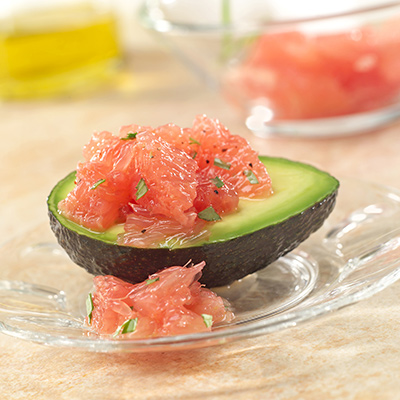- Strawberries
- Cook With Apples
- Grapes
- Grapefruit
- Lemons
- Cabbage
- Asparagus
- All About Bulb Vegetables
- All About Cruciferous Vegetables
- Squash
- All About Root Vegetables
- The Gift of Spice
- Thyme
- Basil
- Raspberries
- All About Tuber Vegetables
- Marjoram / Oregano
- Lemongrass / Citronella
- All Our Fruits, Vegetables and Fresh Herbs
- All About Exotic Fruits
- All About Legumes
- Cooking Pears: Three Inspirational Methods
The Avocado - a surprising and healthy fruit!

While avocados are cholesterol-free like all fruits and vegetables, they do contain a fair amount of fat, but this fat isn't bad for your health. In fact, most of the fatty acids in avocadoes are monounsaturated. These "good" fatty acids play a heart-healthy role, helping to blood cholesterol levels.
Tips and advice
- With their nutty-flavoured, creamy flesh, avocados go well with citrus fruit and salty foods such as ham and shrimp.
- Avocados are usually eaten raw, split in two and sprinkled with lemon juice or in salads, sandwiches and dips such as the classical Mexican guacamole.
- To split an avocado, cut it in two lengthways and twist the two halves in opposite directions to separate them. Using a knife, lift the pit out.
- Cut avocados discolour rapidly; sprinkle them with lemon juice to prevent this.
Little-known Fact
Why are avocados sometimes rock-hard in supermarkets?
- Avocados begin to ripen when they are cut from the tree, which is why they are sometimes rock-hard in the store.
- Once they begin to soften, they spoil quickly. So it's best to buy relatively firm avocados free of blemishes and ripen them at home in a paper bag at room temperature.
How to ripen an avocado?
- Avocados don't ripen properly in the refrigerator.
- To test ripeness, press an avocado lightly with your fingers; a ripe avocado will give a little.
- Depending on the variety, as a general rule an avocado's dark green peel becomes black when ripe.













